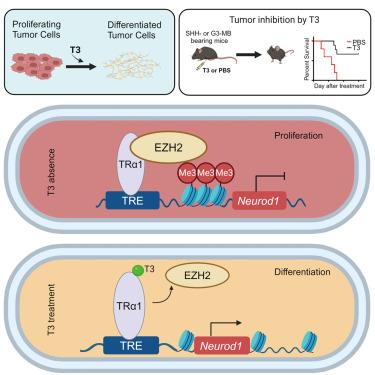当前位置:
X-MOL 学术
›
Cancer Cell
›
论文详情
Our official English website, www.x-mol.net, welcomes your
feedback! (Note: you will need to create a separate account there.)
Thyroid hormone suppresses medulloblastoma progression through promoting terminal differentiation of tumor cells
Cancer Cell ( IF 48.8 ) Pub Date : 2024-08-12 , DOI: 10.1016/j.ccell.2024.07.008 Yijun Yang 1 , Silvia Anahi Valdés-Rives 1 , Qing Liu 2 , Tong Gao 3 , Chakkapong Burudpakdee 1 , Yuzhe Li 2 , Jun Tan 2 , Yinfei Tan 4 , Christian A Koch 5 , Yuan Rong 6 , Steven R Houser 7 , Shuanzeng Wei 4 , Kathy Q Cai 8 , Jinhua Wu 3 , Sheue-Yann Cheng 9 , Robert Wechsler-Reya 10 , Zeng-Jie Yang 1
Cancer Cell ( IF 48.8 ) Pub Date : 2024-08-12 , DOI: 10.1016/j.ccell.2024.07.008 Yijun Yang 1 , Silvia Anahi Valdés-Rives 1 , Qing Liu 2 , Tong Gao 3 , Chakkapong Burudpakdee 1 , Yuzhe Li 2 , Jun Tan 2 , Yinfei Tan 4 , Christian A Koch 5 , Yuan Rong 6 , Steven R Houser 7 , Shuanzeng Wei 4 , Kathy Q Cai 8 , Jinhua Wu 3 , Sheue-Yann Cheng 9 , Robert Wechsler-Reya 10 , Zeng-Jie Yang 1
Affiliation

|
Hypothyroidism is commonly detected in patients with medulloblastoma (MB). However, whether thyroid hormone (TH) contributes to MB pathogenicity remains undetermined. Here, we find that TH plays a critical role in promoting tumor cell differentiation. Reduction in TH levels frees the TH receptor, TRα1, to bind to EZH2 and repress expression of NeuroD1, a transcription factor that drives tumor cell differentiation. Increased TH reverses EZH2-mediated repression of NeuroD1 by abrogating the binding of EZH2 and TRα1, thereby stimulating tumor cell differentiation and reducing MB growth. Importantly, TH-induced differentiation of tumor cells is not restricted by the molecular subgroup of MB, suggesting that TH can be used to broadly treat MB subgroups. These findings establish an unprecedented association between TH signaling and MB pathogenicity, providing solid evidence for TH as a promising modality for MB treatment.
中文翻译:

甲状腺激素通过促进肿瘤细胞的终末分化来抑制髓母细胞瘤的进展
甲状腺功能减退症常见于髓母细胞瘤 (MB) 患者。然而,甲状腺激素 (TH) 是否会导致 MB 致病性仍未确定。在这里,我们发现 TH 在促进肿瘤细胞分化中起关键作用。TH 水平降低使 TH 受体 TRα1 释放出来与 EZH2 结合并抑制 NeuroD1 的表达,NeuroD1 是一种驱动肿瘤细胞分化的转录因子。TH 增加通过消除 EZH2 和 TRα1 的结合来逆转 EZH2 介导的 NeuroD1 抑制,从而刺激肿瘤细胞分化并减少 MB 生长。重要的是,TH 诱导的肿瘤细胞分化不受 MB 分子亚群的限制,表明 TH 可用于广泛治疗 MB 亚群。这些发现在 TH 信号传导和 MB 致病性之间建立了前所未有的关联,为 TH 是一种有前途的 MB 治疗方式提供了坚实的证据。
更新日期:2024-08-12
中文翻译:

甲状腺激素通过促进肿瘤细胞的终末分化来抑制髓母细胞瘤的进展
甲状腺功能减退症常见于髓母细胞瘤 (MB) 患者。然而,甲状腺激素 (TH) 是否会导致 MB 致病性仍未确定。在这里,我们发现 TH 在促进肿瘤细胞分化中起关键作用。TH 水平降低使 TH 受体 TRα1 释放出来与 EZH2 结合并抑制 NeuroD1 的表达,NeuroD1 是一种驱动肿瘤细胞分化的转录因子。TH 增加通过消除 EZH2 和 TRα1 的结合来逆转 EZH2 介导的 NeuroD1 抑制,从而刺激肿瘤细胞分化并减少 MB 生长。重要的是,TH 诱导的肿瘤细胞分化不受 MB 分子亚群的限制,表明 TH 可用于广泛治疗 MB 亚群。这些发现在 TH 信号传导和 MB 致病性之间建立了前所未有的关联,为 TH 是一种有前途的 MB 治疗方式提供了坚实的证据。


















































 京公网安备 11010802027423号
京公网安备 11010802027423号